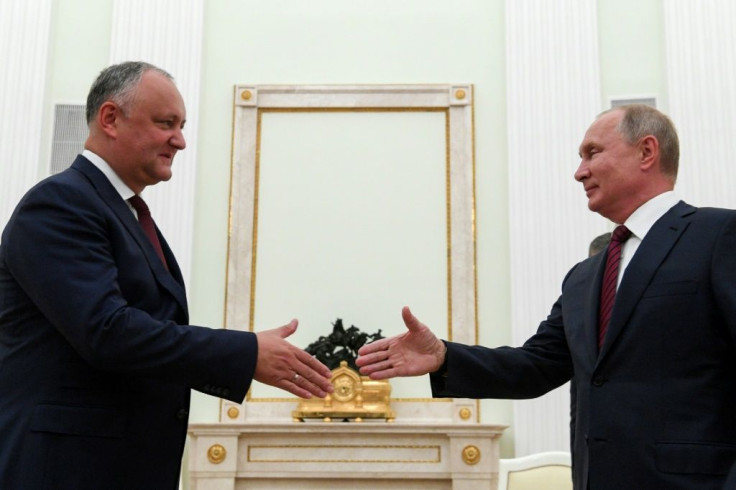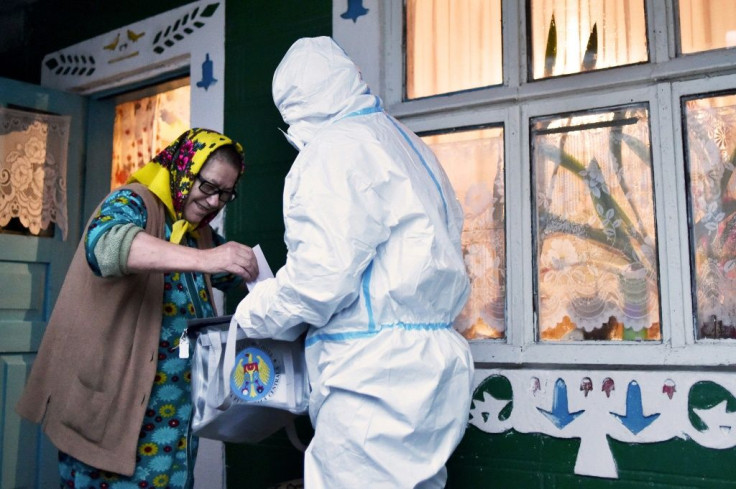Moldova Torn Between Russia And West In Election Runoff
Moldova heads to the polls Sunday for the second round of a tightly-contested presidential election pitting a pro-European challenger against the country's Moscow-backed incumbent.
The tiny ex-Soviet nation votes under the watchful eye of Russia, which wants polarised Moldova to remain in its sphere of influence as several Kremlin-aligned governments are rocked by political unrest.
In the first round vote earlier this month, pro-European Maia Sandu -- a 48-year-old centre-right politician -- won a surprise victory.
Sandu, who worked for the World Bank and briefly served as prime minister, won over 36 percent of the vote against pro-Russian incumbent Igor Dodon's 33 percent.

Polls published in the run-up to Sunday's vote showed the two candidates in a tight race once again.
Analysts said that Sandu topped the first round vote thanks to unprecedented support from Moldova's large diaspora and that voters abroad would play a key role Sunday too.
Impoverished Moldova in recent years has been rocked by several political crises and a $1 billion bank fraud scheme equivalent to nearly 15 percent of the country's GDP.
"Many will vote not for Sandu but against Dodon," who has become a "symbol of corruption" during his four years in office, Moldovan lawyer and activist Stefan Gligor told AFP.

Ahead of the November 15 run-off, Sandu on her Instagram page called on voters to cast their ballots to "drive a great thief out of power".
She wants Moldova to join the European Union and has promised to curtail the president's spending and defend the country's interests against Russia.
The country of 3.5 million has long been divided between those favouring closer ties with the EU and those who cling to Soviet-era relations with Moscow.
Although part of the Soviet Union until its collapse in 1991, the small nation between Ukraine and Romania has close historical ties with Romania and its main language is Romanian.

After the first round of the vote, Romanian President Klaus Iohannis said he was "happy" with the result.
Dodon, 45, came to power after beating longtime rival Sandu in a 2016 election and is hoping to defeat her again.
Casting himself as a guarantor of stability, Dodon is promising voters "good relations with Russia" and "change for the better".
He has repeatedly attacked Sandu, saying she does not care about the country and has called her "hysterical".
Russian President Vladimir Putin urged Moldovan voters to back Dodon, noting that their country's economy -- battered by the coronavirus pandemic -- is linked to Russia.
"We hope that the Moldovan people will appreciate the efforts of their president in the election," Putin said last month.
Faced this year with multiple protest movements targeting its allies in Belarus and Kyrgyzstan, Russia will be watching Sunday's vote closely.
Last month, Moscow accused the United States of preparing a "revolution" in Moldova.
The head of Russia's Foreign Intelligence Service (SVR) Sergei Naryshkin alleged that Washington was inciting the Moldovan opposition to take to the streets after the vote to denounce its validity and demand a re-run.
Analysts said a victory for Dodon Sunday could spark protests especially in the event of a tight result.
"If his gap with Sandu doesn't exceed 1-3 percent, those who supported her will take to the streets" to denounce fraud, Sergiy Gerasymchuk, a Kyiv-based expert on Moldovan politics, told AFP.
If Sandu does win Sunday, her room for manoeuvre will be limited as the majority of parliament is loyal to her rival.
"Her position is very precarious," said Gerasymchuk, because even in the event of early legislative elections, "there is a good chance that she will not get a clear majority".
© Copyright AFP {{Year}}. All rights reserved.



















